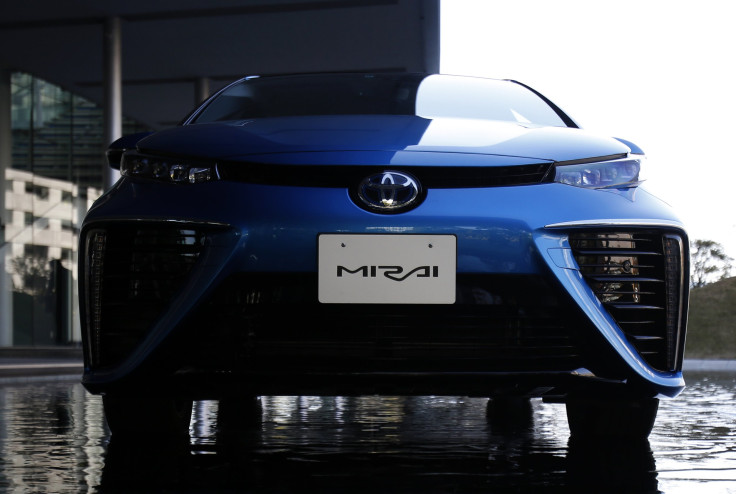Is US Ready For Hydrogen Cars? After Toyota Frees Hydrogen Cell Patents, Market Could Be Slow To Act

Toyota's move this week to introduce hydrogen cars into the U.S. could fuel new technologies in the clean energy auto market and inspire innovators. But it's unlikely Toyota's announcement Monday that competitors may use its fuel cell patents for the next five years for free will actually have much of an impact on U.S. car buyers because the market is still years away from meeting demands, auto industry experts said.
“I don’t expect there to be a day-to-day impact on sales,” said John O’Dell, senior editor at Edmunds.com. “It takes several years for a design to come to life from the drawing board, and it’d be great if companies can piggy-back off of someone else’s work.”
One of the biggest obstacles to making hydrogen cars is fuel, said O’Dell, and without charging stations and a reliable way to produce the energy, hydrogen cars cannot take off. “Hydrogen cars are not going to replicate the gasoline model,” O’Dell said.
There is a current glaring lack of hydrogen and electric car charging stations in California, where most of these cars are sold. A recent study showed how merely 68 stations can effectively cover 80 to 90 percent of all California for hydrogen car charging, given a six-minute drive, and if more manufacturers come into the business, they can subsidize the building of these stations.
All 5,680 of the Japanese car manufacturer’s patents will be freely available for use after the company announced the launch of its hydrogen fuel cell vehicle (FCV) Toyota Mirai for sales in California in mid-2015. At least 1,970 of the patents relate to in-vehicle fuel stacks, 290 are about the high-pressure hydrogen fuel tanks transportation technology, and 70 relate to hydrogen production, according to Gizmodo. Toyota’s move to open up its patents is similar to Tesla’s Elon Musk’s recent announcement to open access to its electric car patents.
“I think why they’re doing this is to make the system open to the public,” said automotive analyst Kevin Riddell, at auto industry watcher LMC Automotive. “While it sounds contradictory that they’re willingly bringing in competition, this competition can actually help the refueling infrastructure grow.”
Toyota knows that by opening up the FCV market, the competition can actually help them grow, O'Dell said. “Not everyone is a Toyota kind of person,” he said. “Toyota’s not going to make 15 different cars, and if there’s just one brand with just one model, people are not going to be kept interested."
While the country seems to be slowly moving toward greener car technologies, car companies will not expect to turn a profit in the short term because of the cost. “There has been a lot of government legislation supporting hydrogen technology,” said Riddell. “But these cars are probably going to be sold at a loss in the short term.”
There are other hurdles. First, is the getting over false perceptions. “Some people still think hydrogen cars will explode,” although gasoline car fires are more common, O'Dell said.
Second, the industry needs to figure out how to more cleanly produce hydrogen power. Roughly 95 percent of hydrogen power is made from methane, a greenhouse gas, and much of that escapes into the air when producing power for the fuel cells. Not only is it not as environmentally-sound as it is made out to be, electricity is needed to make hydrogen power, and many critics have wondered if it is worth using all that power for what is supposed to be “clean energy.”
Riddell, however, said that the cleanliness of energy production will barely affect hydrogen car sales. “The average person who buys a hydrogen car is not going to be too concerned with how that power is made,” he said.
© Copyright IBTimes 2024. All rights reserved.






















